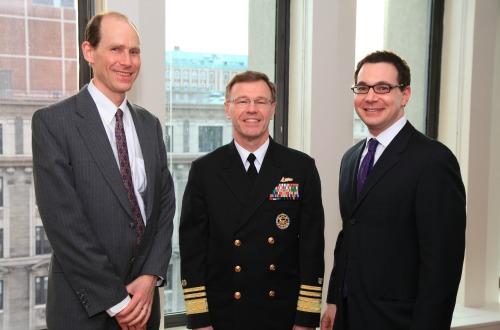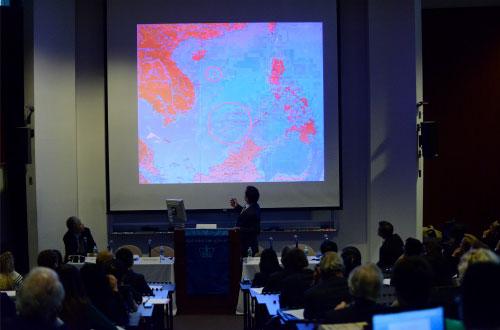Into the Depths
Columbia Law School Professors Matthew Waxman and Benjamin Liebman Draw from Combined Strengths in National Security and Chinese Law in an Innovative New Course Exploring the Law of the Sea
New York, March 12, 2015—As tensions mount between China and its neighbors over disputed maritime territory in the South and East China Seas, Columbia Law School students aren’t just following the latest developments in the news—they also are learning about the law that governs the conflicts in an innovative new class taught by leading scholars in the relevant fields.
National security law expert Professor Matthew C. Waxman has teamed up this semester with Chinese law expert Professor Benjamin L. Liebman to teach the seminar, Law of the Sea: Law and Maritime Strategy in Asia. The course explores the way states regulate activities on and under the ocean including energy and mineral development, military uses, and boundary issues, while examining future flashpoints and the mechanisms for resolving disputes.
“There’s a mismatch between the immense importance of these issues and the paucity of teaching and scholarship on them in the United States,” Waxman said, explaining the rationale for the course. “Professor Liebman and I believe this is one of the most important areas of international law.”
Waxman and Liebman bring incredible—and complementary—experience to the topic. Waxman has held senior positions at the U.S. Department of State, Department of Defense, and National Security Council; Liebman studies Chinese international relations, law, and legal institutions. In 2012, Liebman was invited to the White House to discuss human rights and legal reforms in China with Vice President Joe Biden and senior Obama administration advisers.
But the professors have expanded the breadth of the course by inviting practitioners to serve as guest lecturers, including officials from the U.S. Department of State, the Center for Strategic and International Studies in Washington, D.C., and the U.S. Naval War College.
“A central goal of this course is to explore the role that law can play in helping to resolve rising tensions and rival claims in the region,” Liebman said. “There are, of course, different views on what the relevant legal rules are and what they mean. Understanding the range of views and legal arguments is also an important first step toward thinking about legal solutions to the disputed claims.”
Waxman, faculty co-chair of the Roger Hertog Program on Law and National Security, and Liebman, director of the Center for Legal Studies, have collaborated before to address law of the sea issues. In February 2012, they hosted then-Vice Admiral James W. Houck, the U.S. Navy Judge Advocate General, for a discussion of the U.N. Convention on the Law of the Sea, which the United States has not signed. Later that year, the Law School’s Center for Constitutional Governance convened a roundtable discussion on “International Law and the South China Sea” with representatives from 30 foreign governments.
Professors Benjamin Liebman (top left) and Matthew Waxman (top right) have collaborated on law of the sea issues before. In 2012, they hosted Vice Admiral James W. Houck (top center), the U.S. Navy Judge Advocate General, for a discussion of the U.N. Convention on the Law of the Sea. Later that year, the Law School brought together representatives from 30 foreign governments to discuss international law and the South China Sea. |
“The law of the sea is not part of most schools’ standard international law curricula,” Waxman said. “But 70 percent of the earth’s surface is covered by water, and the U.S. is one of the biggest maritime powers in the world. We feel Columbia Law School should be a leader in this field.”
The seminar includes international J.D. and LL.M. students, graduate students from Columbia University’s Department of Political Science and School of International and Public Affairs, and professionals whose careers have already or will involve law of the sea considerations, including former U.S. Navy Surface Warfare Officer Jeffrey W. Coyle ’16.
Coyle’s five years of military service included an assignment with the 7th Fleet, a collection of 80 ships, 140 aircraft, and 40,000 Navy and Marine Corps personnel that maintain a presence in the Western Pacific and Indian Oceans to promote peace, regional cooperation, and stability.
“I had a lot of experience operating in the waters around China and the Korean Peninsula,” Coyle said. “I knew a lot of what we were doing there was informed by the law of the sea, so I thought it would be interesting to learn about the legal basis for that work.”
At a recent session of the class, students heard from U.S. Naval War College Professor Peter Dutton, director of the college’s China Maritime Studies Institute, who focuses his research on American and Chinese views of sovereignty and international law of the sea and the strategic implications of each country’s choices in the area. He discussed China’s handling of law of the sea disputes, including its approach to an ongoing International Court of Justice proceeding initiated by the Philippines.
U.S. Navy Judge Advocate General’s Corps attorney Cameron Rountree Nelson ’15 LL.M., who expects to confront law of the sea questions when she continues her career in the Navy after earning her master’s in international law, said she has appreciated the chance to learn from the experts and her fellow students.
“The course is structured to maximize discussion,” she said. “It is a very engaging learning opportunity.”

